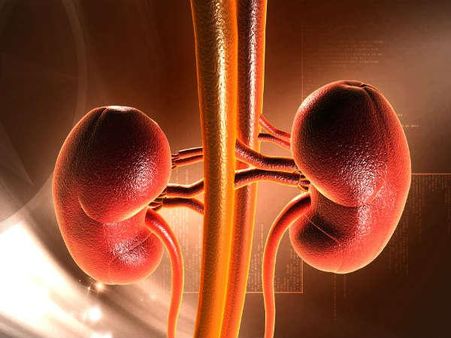Just In
- 1 hr ago

- 2 hrs ago

- 5 hrs ago

- 9 hrs ago

Don't Miss
- Movies
 When Rekha Talked About 'Drinking Binges, Taking Drugs & Being Impure': I've Been Lusting Like Hell
When Rekha Talked About 'Drinking Binges, Taking Drugs & Being Impure': I've Been Lusting Like Hell - Sports
 'It Would be Awesome': Rohit Sharma advocates for India vs Pakistan Bilateral Series with Special Condition
'It Would be Awesome': Rohit Sharma advocates for India vs Pakistan Bilateral Series with Special Condition - Technology
 Vivo V30e Launch Date in India set for May 2: Flipkart Availability Confirmed
Vivo V30e Launch Date in India set for May 2: Flipkart Availability Confirmed - Finance
 Rs 14/Share Dividend: Stockbroking Co To Consider Bonus Share, Shares Up 126% In 180-Days
Rs 14/Share Dividend: Stockbroking Co To Consider Bonus Share, Shares Up 126% In 180-Days - News
 Karnataka Weather Alert: Light Rains Likely In Bengaluru In Next 24 Hours, Check Latest Forecast
Karnataka Weather Alert: Light Rains Likely In Bengaluru In Next 24 Hours, Check Latest Forecast - Travel
 Journey From Delhi To Ooty: Top Transport Options And Attractions
Journey From Delhi To Ooty: Top Transport Options And Attractions - Education
 IIIT-Bangalore Introduces PG Diploma In Digital Product Design And Management
IIIT-Bangalore Introduces PG Diploma In Digital Product Design And Management - Automobiles
 Jawa Yezdi Expands Mega Service Camps To 32 New Cities, Focusing On Tier-II And Tier-III Regions
Jawa Yezdi Expands Mega Service Camps To 32 New Cities, Focusing On Tier-II And Tier-III Regions
Excess Protein Consumption Can Lead To These Problems
Consuming protein in excess amount can cause several health issues. Check here for details.
It is a known universal fact that every cell and organ in the body needs protein. Your hard earned muscles are happy with the protein intake. Protein keeps your stomach from growling an hour after you eat and your metabolism humming at a fiery pace.
Not getting enough protein is one of the reasons why muscle building might not work out or happen. Hence protein intake is very crucial.
While protein consumption is vital, do we know that there could be adverse effects with too much consumption of the same? Taking in too much of protein can cause unpleasant symptoms such as nausea and diarrhoea.

Sometimes, you could also develop more serious problems because excessive protein leads to building up of amino acids, insulin or ammonia in your blood stream.
The Institute of Medicine recommends that protein-rich foods should account to 35% of the calories you consume. An average woman should get about 46 grams of protein a day and men should get about 56 grams of protein a day.
Also, active people need more protein than sedentary people. So, if you are involved in moderate to vigorous exercise, it is better that you consult your doctor on your protein intake.
In this article, we shall focus on the adverse effects that can be caused with too much of protein consumption.

Dehydration:
One of the waste products that the kidney creates during the process of filtration is blood urea nitrogen. Studies have proven that as protein intake goes up, hydration goes down because the body has to use a lot of water to flush out that additional nitrogen. Hence experts recommend to drink half a gallon of water per 100 grams of protein.

Risk Of Kidney Problems:
Evidences have shown that diets higher in protein put a greater strain on the kidneys, which do the crucial job of filtering waste products that come out when the body digests protein. Studies have also shown that such damage to the kidneys are noticeable only among people with early stages of kidney disease.

Weight Gain:
Your body is accustomed to use only a certain amount of protein each day. Each gram of protein contains 4 calories. If you consume too much protein you can possibly gain weight.
For instance, let's say you consume 100 grams of protein, your body will use only 50 grams of it and the rest of the 50 grams which is equivalent to 200 calories will be stored in your body as fat.

Risk Of Osteoporosis:
Osteoporosis is a situation of bone loss or weakening of bones. This situation occurs when calcium content is removed from the bones in the body in order to fulfil the body's metabolic requirements for this stored mineral.
Now the question is, why does the body need so much of calcium that it has to steal it away from your bones? The simple answer from researchers are that, the more protein you take in, the more calcium you excrete. It has been proven that if your diet contains 50% more protein, it may result in 1% loss of bone per year.

Constipation:
People who consume high quantities of protein forget that they should consume high quantities of fibre as well. It is not the protein but the lack of fibre that causes constipation. The best way to overcome this is to regularly consume high-fibre foods.

Nausea:
Eating too much of protein-rich food can make you feel nauseated due to indigestion. When you consume protein, digestive enzymes in your stomach and small intestine break down the large protein molecules into individual amino acids that you can absorb later.
A sudden inflow of protein can overwhelm the ability of your digestive enzymes to match the pace with which you consume these proteins. Until your digestive system catches up you will experience nausea.

Stomach Cramps & Bloating:
Eating too much protein at a time can inundate your digestive enzymes with more material than they can handle, causing your digestion to become slow. As this process slows down, your stomach may hurt, causing cramps and bloating.

Fatigue:
Many people follow a high-protein diet as a popular method for weight loss. You increase your intake of protein and fat while reducing on your carbohydrate consumption to ensure that a metabolic change happens within the body which eventually causes a lot of weight loss.
However, this metabolic change coupled with carbohydrate restriction can sometimes lead to undesirable side effects, including fatigue.

Reduced Appetite:
Consuming a high-protein diet can boost the release of a hunger suppressing hormone. A diet rich in protein may be a good way to lose weight and keep it off. However, a recent study done on mice shows that a protein-heavy diet produced higher levels of an appetite regulating protein called peptide YY (PYY) which is linked to reduced appetite in human beings.
-
 healthAmul’s New Protein Product For Gym-Goers And Vegetarians: Know More About ‘Super Milk’
healthAmul’s New Protein Product For Gym-Goers And Vegetarians: Know More About ‘Super Milk’ -
 healthReasons Why You Start Your Day With A Banana Oats Protein Smoothie
healthReasons Why You Start Your Day With A Banana Oats Protein Smoothie -
 healthKickstart Your Weight Loss Journey With A Protein-Diet: 5 Tips
healthKickstart Your Weight Loss Journey With A Protein-Diet: 5 Tips -
 healthProtein Shake For Weight Loss: Burn Stubborn Belly Fat With This Delicious Recipe
healthProtein Shake For Weight Loss: Burn Stubborn Belly Fat With This Delicious Recipe -
 healthCan Vegan Protein Support Muscle Building?
healthCan Vegan Protein Support Muscle Building? -
 nutritionWhat Happens When You Stop Eating Eggs Completely?
nutritionWhat Happens When You Stop Eating Eggs Completely? -
 nutritionHealth Benefits Of Samak Rice (Barnyard Millet): How Is It Different From Regular Rice?
nutritionHealth Benefits Of Samak Rice (Barnyard Millet): How Is It Different From Regular Rice? -
 recipesEggs On Sunday: How To Make Protein-Packed Egg Bread Toast For Breakfast
recipesEggs On Sunday: How To Make Protein-Packed Egg Bread Toast For Breakfast -
 recipesSaturday Night Dinner Recipe: How To Make Heart-Healthy Chicken Pasta
recipesSaturday Night Dinner Recipe: How To Make Heart-Healthy Chicken Pasta -
 offer of the dayAmazon Sale: Huge Discounts On Whey And Plant-Based Protein Powders, Shop From Top Nutrition Brands
offer of the dayAmazon Sale: Huge Discounts On Whey And Plant-Based Protein Powders, Shop From Top Nutrition Brands -
 nutritionWhy You Should Add Black Beans To Your Diet
nutritionWhy You Should Add Black Beans To Your Diet -
 wellnessWho Is A Pescatarian? Benefits Of A Pescatarian Diet, Its Drawbacks, What To Eat And Other Details
wellnessWho Is A Pescatarian? Benefits Of A Pescatarian Diet, Its Drawbacks, What To Eat And Other Details


 Click it and Unblock the Notifications
Click it and Unblock the Notifications



